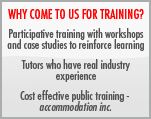Ex 115 - ISO/IEC 27001:2005 INTERNAL AUDITOR
Overview
An interactive TWO DAY course based on workshops and case studies to provide auditors with the skills to plan, execute, report and positively follow-up corrective action for internal audits. The course is designed to follow the stages in a live audit, including simulated audit interviews and role play closing meetings.
This course introduces the delegate to auditing as a powerful management tool. Through practical workshops and simulated audit interviews, you learn how to conduct effective process audits within your organization. You also learn how to plan, structure and conduct an internal audit, including the evaluation of effective corrective action.
Key Session Topics
- The interrelationship between ISO/IEC 27001:2005, ISO/IEC 17799:2005, ISO 9001:2000, and GMITS.
- Understand hazard identification & risk assessment and audit of them.
- Undertaking an effective Quality Management System Audit against ISO/IEC 27001:2005.
- Producing an internal audit programme.
- How to plan a process based audit; resources and timings; use of checklists
- Evaluating the significance of audit findings
- Improving communication skills in the presentation of audit reports
- Corrective action for effectiveness of management systems.
Benefits
- Competence in assessing the organisation’s ability to manage risk and provide essential ISMS controls.
- An understanding of the role of audits within the ISMS and the role of auditors in effecting continual improvement.
- Develop more effective auditing techniques, improve evaluation and communication skills, develop more professional reporting and increase your ability to implement corrective action programmes.
Who Should Attend
- Those wishing to undertake internal audits of information security management systems.
- Managers, whose departments will be subject to these audits, to help them appreciate the benefits that structured audits and the resultant corrective action can bring.
Course Techniques
Theory is combined with case studies and practical interactive workshops on auditing systems and techniques, thus providing attendees with the opportunity to practise their skills during simulated audits. This practical emphasis, along with high tutor to delegate contact hours, allow a substantial degree of individual guidance and tuition. Evening work groups prepare responses to a case study. Reference information is available to keep.
Follow-Up
Attendees’ subsequent in-house audits can be supervised to give practical
on-site training in addition to consultancy support to identify and progress
improvements.


